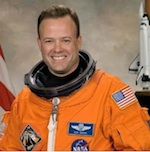by Ron Garan
- Published: Saturday, April 12 2014 07:00
Whether viewing space from the Earth, or Earth from space, the cosmos have the ability to unite us as inhabitants of one planet. This essay by former NASA astronaut Ron Garan, originally posted on his personal Google+ page, is a response to NASA's recent decision to curtail cooperation with Russia's space program in all but critical missions. It epitomizes the ethos behind Astronomers Without Borders and its motto, One People, One Sky.
In any crisis the worst thing we can do is stop talking.
We should not allow NASA and the Nobel Peace Prize nominated International Space Station program to be used as pawns in political conflict.
The international space exploration partnership is one of the greatest collaborative international partnerships in history. It makes no sense to potentially sacrifice what works well in order to apply pressure to salvage something that doesn't.
On July 17th 1975 Soviet Cosmonaut Alexei Leonov and American Astronaut Tom Stafford reached across the hatches of their docked Soyuz and Apollo spacecraft and shook hands 140 miles above the Earth bringing to an end to a long, bitter and expensive space race.
As a fighter pilot during the Cold War and having trained for years to fight the Russians, the true success of the cooperation of nations in the common goal of space exploration was driven home to me personally on April 4th 2011.
On that day, I stood with two Russian crew mates at the base of a Soyuz rocket named in honor of Yuri Gagarin, the first human to launch from Earth into space. "Our" rocket stood on the same launchpad Yuri Gagarin launched from on that historic day 50 years earlier.
As I stood in this previously top secret Soviet military installation, I looked up to see an American flag as I watched clouds of oxygen roll off the rocket that would take the three of us into space. Surreal for me as a US Air Force fighter pilot – who grew up during the duck and cover days of the Cold War.
The willingness to work together on the peaceful exploration of space is nothing new and is probably best illustrated in President Kennedy’s famous “We Choose the Moon” speech “For the eyes of the world now look into space, to the moon and to the planets beyond, and we have vowed that we shall not see it governed by a hostile flag of conquest, but by a banner of freedom and peace. We have vowed that we shall not see space filled with weapons of mass destruction, but with instruments of knowledge and understanding.”... “There is no strife, no prejudice, no national conflict in outer space as yet. Its hazards are hostile to us all. Its conquest deserves the best of all mankind, and its opportunity for peaceful cooperation may never come again.”
After signing the agreement for the historic Apollo-Soyuz mission, Soviet leader Leonid Brezhnev, noted, "The Soviet and American spacemen will go up into outer space for the first major joint scientific experiment in the history of mankind. They know that from outer space our planet looks even more beautiful. It is big enough for us to live peacefully on it, but it is too small to be threatened by nuclear war" .
The international space exploration program rises above all our squabbles here on the ground. We should not drag it down here. We have a history of cooperation even at the height of conflict on the ground. This history serves as a foundation for our international relationships and a shining light to guide us through the uncertainties ahead.
Yes, the US should develop the capability to once again to launch humans into space but once we do, make no mistake, continuing a strong partnership with Russia in space exploration is in the best long-term interest of the US and our other international partners.
Please help spread the word that we should keep dialog open and we should not use the space program as a political tool
This blog is a crosspost with permission from Ron Garan essay in his personal Google+ page
###
 Ron recently returned from a six-month mission of scientific research and exploration aboard the International Space Station. One of his personal objectives during his mission was to use the unique orbital perspective to put a focus on the challenges facing our planet. Ron has a strong belief in the ability of social entrepreneurialship and appropriately targeted philanthropy to solve many of the problems we face here on Earth.
Ron recently returned from a six-month mission of scientific research and exploration aboard the International Space Station. One of his personal objectives during his mission was to use the unique orbital perspective to put a focus on the challenges facing our planet. Ron has a strong belief in the ability of social entrepreneurialship and appropriately targeted philanthropy to solve many of the problems we face here on Earth.








Comments